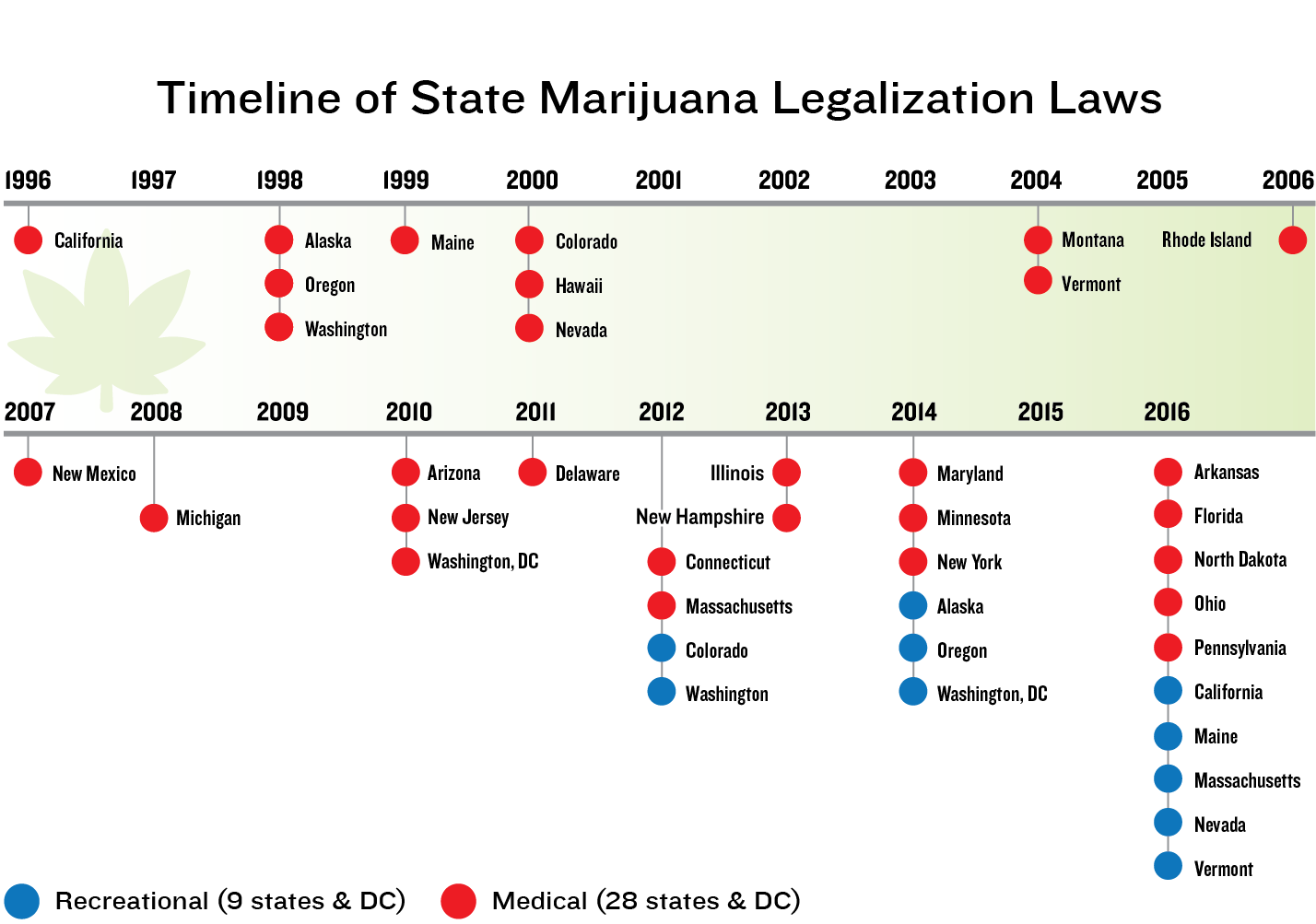Two Important Facts About Cannabis and Vaping and One Important Opportunity for the New Year!
Two Important Facts About Cannabis and Vaping and One Important Opportunity for the New Year!
Important Fact #1
Cannabis is a federally controlled Schedule I drug under federal law. While cannabis use and possession are illegal according to federal law since the passage of the Controlled Substances Act of 1970, that has not stopped 35 states from legalizing the medical use of cannabis. Recreational use of cannabis is legal in 15 states. And 13 states allow products with limited THC contents (Legality of cannabis by U.S. jurisdiction, 2020). This dramatic shift has occurred since 1996, when California became the first state to legalize cannabis for any use. While partial documentation of this shift is only shown through 2016 in the graphic below, the visual impact of the acceleration of states legalizing cannabis is very obvious (link to original site provided).
Important Fact #2
In E-Cigarette Use Among Youth and Young Adults, A Report of the Surgeon General, the emergence of vaping as a major public health concern is well-documented. What began as a patent for an electronic device for delivering tobacco products in 1963 had, during the years 2011-2015, facilitated a whopping 900% increase in use among high school students in the U.S. The use of e-cigarette or other vaping devices suddenly surpassed “conventional tobacco products, including cigarettes, cigars, chewing tobacco, and hookahs (National Center for Chronic Disease Prevention and Health Promotion (U.S.), 2016). These devices are commonly used to deliver nicotine to the lungs, which is known to be aa deadly health hazard for adults. For youth and young adults, the impact on the developing brain and other adverse effects on the body and behavior can be devastating. While most of the devices are used to deliver nicotine, human creativity has also resulted in them being used to deliver cannabis and other drugs by heating and aerosolizing them. Though the delivery method is very effective the e-cigarette liquids, solvents, flavoring agents, and other intoxicants, can be toxic.
These “two important facts” raise a number of unanswered political, legal, moral, and public health questions for the future of vaping and cannabis:
- How should employers deal with employees in the workplace who have used use cannabis legally under new state laws?
- How does the general acceptance of cannabis use both medically and recreationally affect attitudes and use by youth?
- Will cannabis become legal at the federal level in the US as it has recently become legal in Canada? If so, what would that system look like?
- How does cannabis fit into the fabric of our society in the future?
- How can we create policies that promote the first goal of the Surgeon General’s Call to Action on E-Cigarette Use Among Youth and Young Adults, to “First, Do No Harm”?
- How can information be provided to stakeholders to educate parents, teachers, coaches, and other influencers of youth on the risks of e-cigarette use?
- How can e-cigarettes be regulated at the Federal level to protect public health?
- What programs and policies can prevent vaping and cannabis use among youth and young adults?
- What can be done to restrict advertising that markets vaping and cannabis to youth?
- How can data-gathering, research, and evaluation related to vaping and cannabis inform the decision-making processes?
Important Opportunity
An important opportunity for answering all of these questions is being offered for behavioral health providers and their colleagues in related fields in Nevada by the Nevada Division of Public and Behavioral Health, Bureau of Behavioral Health, Wellness and Prevention and the Nevada Attorney General’s Office. On January 12-14, 2021, the 3-day virtual Public Health Cannabis and Vaping Summit will be held to “identify Nevada’s priorities and strategies related to legal adult-use, public safety, regulation, prevention, treatment, and oversight of cannabis and vaping products.”
The Public Health Cannabis and Vaping Summit website outlines the following objectives:
- Gain a better understanding of national and Nevada trends in data
- Learn what/how data and implementation in other states should inform strategies
- Identify effective, audience-specific public health messaging
- Understand how to strengthen regulations informed by national and state lessons learned
- Learn what national consensus organizations and other states recommend related to use of cannabis by pregnant women, youth, and persons with opioid use disorder
- Identify best practices for prevention and treatment for use of cannabis and nicotine products
Those who should attend include:
- Healthcare Providers & Public Health Officials
- Substance Use & Treatment Providers
- School Districts
- Youth Organizations
- Regulatory Agencies
- Law Enforcement & Public Safety Professionals
- Policy Makers & Legislators
- Prevention Coalition Partners
- Members of the Public
A wide variety of session tracks will provide content about cannabis and vaping prevention, policies and regulation, public safety, law enforcement, and cannabis and special populations. Continuing education units are available for a wide variety of boards. For more information and to register for the summit, visit the Public Health Cannabis and Vaping Summit website.
References
National Center for Chronic Disease Prevention and Health Promotion (U.S.). Office on Smoking and Health, & United States. Public Health Service. Office of the Surgeon General. (2016). E-cigarette use among youth and young adults: A report of the surgeon general. (). Rockville, MD; Atlanta, GA; U.S. Department of Health and Human Services, Public Health Service, Office of the Surgeon General.
Blog Post Tags:
Related Blog Posts
Related Learning Labs
Related Resources
.
- Buscar Tratamiento de Calidad para Trastornos de uso de Sustancia (Finding Quality Treatment for Substance Use Disorders Spanish Version)
- Finding Quality Treatment for Substance Use Disorders
- Focus On Prevention: Strategies and Programs to Prevent Substance Use
- Monthly Variation in Substance Use Initiation Among Full-Time College Students
- The National Survey on Drug Use and Health (NSDUH) Report: Monthly Variation in Substance Use Initiation Among Adolescents









